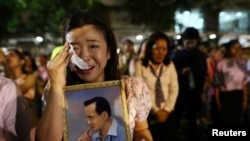Thailand's stock market and currency were shaken as long-ailing King Bhumibol Adulyadej's health worsened this week.
Now, after his death Thursday at age 88, the outlook remains murky. Here are a few of the key factors and indicators to watch for:
SHARE PRICES: Thai stocks slid after the Royal Palace announced that Bhumibol's condition was unstable, the first time it had used that phrase regarding the king's health. On Wednesday, the benchmark fell nearly 7 percent but ended down 4.1 percent. The market could be roiled by a sell-off of assets by palace officials or other members of the political elite.
THAI BAHT: Thailand's currency was trading at 35.69 baht to the U.S. dollar Thursday. It fell 1.1 percent Wednesday and 0.2 percent Thursday. But such gyrations do not compare with the loss in the baht's value triggered by speculative attacks that triggered a region-wide financial crisis in 1997.
ECONOMY ON EDGE: Bhumibol was a constitutional monarch with no formal political role, but was regarded as a unifying figure amid Thailand's perennial political turmoil. Many analysts expect the country to remain calm, as Thais focus on mourning. Few are likely to want trouble with the military junta. But there is concern over the succession, since the king's son, Crown Prince Vajiralongkorn, has not earned the same respect as his father.
POLITICS: Concern over the royal succession has been entwined with Thailand's political turmoil in the past decade, as royalists sought to ensure that they control the process instead of certain politicians whose fealty to the monarchy they doubt. In a report, the Eurasia Group said Bhumibol’s passing would mean a general election scheduled for 2017 would be pushed back to 2018. The overall impact on the business environment, it said, would likely be limited to a 100-day period of mourning that would follow his death.
UNCERTAINTIES: While most analysts expect Thailand's transition to be a stable one, the country remains prone to political upheavals, with affluent urban centers and poorer rural areas. The military has overthrown civilian, democratically elected governments twice in the past decade, though the situation has been relatively calm since the last coup in 2014. Another spate of protests could hurt the tourism sector, which accounts for a tenth of the GDP. In the longer term, past upheavals already have damaged the country's competitiveness as infrastructure projects stalled and investors held back, wary of uncertainty. “The lack of investment is undermining the economy's future productive capacity,” Krystal Tan and Gareth Leather of Capital Economics wrote in a recent report. “The bottom line is that it is difficult to be upbeat about Thailand's medium-term outlook until the political picture becomes clearer.”




